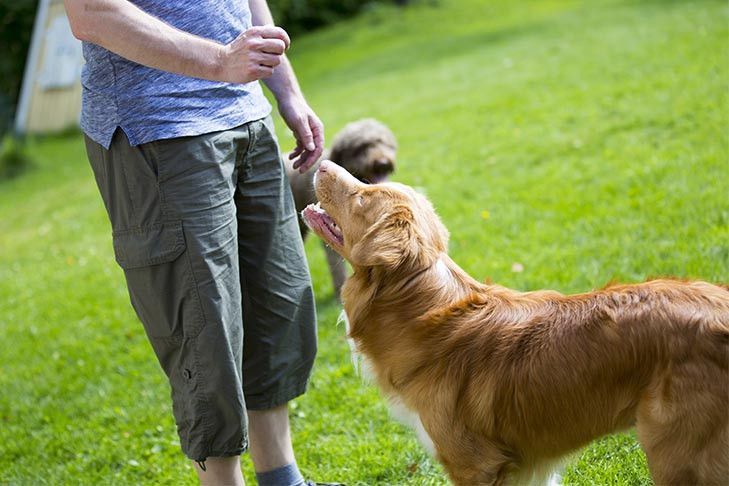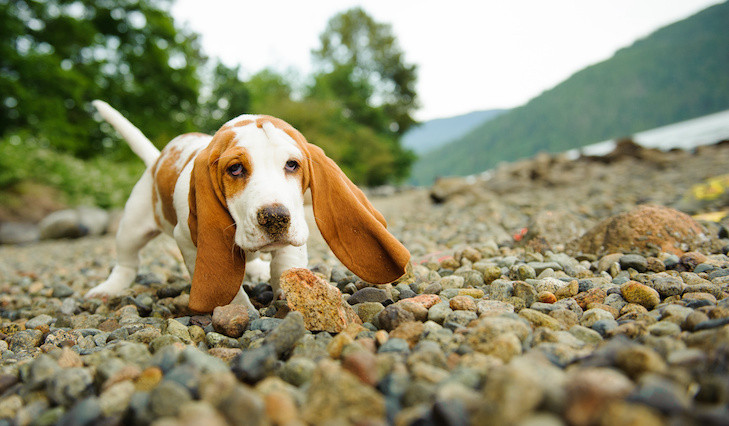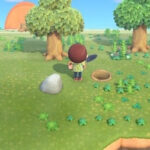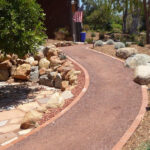Is your puppy eating rocks? It’s a concerning habit, but with the right approach, you can stop it. This comprehensive guide from rockscapes.net explores the reasons behind this behavior and provides actionable strategies, from training commands to environmental modifications, to keep your puppy safe and healthy. Discover how to address this issue effectively and create a safer environment for your furry friend using canine enrichment, rock-free landscaping, and professional guidance.
Table of Contents
- Why Do Puppies Eat Rocks? Understanding the Root Causes
- Health Risks of Rock Consumption: Protecting Your Puppy
- Training Techniques: Teaching “Leave It” and “Drop It”
- Environmental Management: Creating a Rock-Free Zone
- Diet and Nutrition: Addressing Potential Deficiencies
- Enrichment and Exercise: Combating Boredom
- Medical Evaluation: Ruling Out Underlying Health Issues
- Alternative Chewing Options: Providing Safe Substitutes
- When to Seek Professional Help: Consulting a Veterinarian or Behaviorist
- Long-Term Prevention: Maintaining a Safe Environment
- Frequently Asked Questions (FAQs): Addressing Common Concerns
1. Why Do Puppies Eat Rocks? Understanding the Root Causes
Is your puppy ingesting rocks? There are several reasons why your puppy might be eating rocks, ranging from behavioral issues to underlying health concerns. Puppies often explore the world through their mouths, and rock consumption can be a phase, a sign of boredom, or an indication of a more serious problem. Understanding the possible causes is the first step in addressing this potentially dangerous behavior with effective training techniques, environmental adjustments, and, if necessary, veterinary consultation.
- Pica: This is an eating disorder characterized by the consumption of non-food items. Pica in puppies can be due to nutritional deficiencies, such as a lack of certain minerals or vitamins.
- Boredom or Attention-Seeking: Puppies, like children, may resort to unusual behaviors to alleviate boredom or gain attention from their owners.
- Teething: Puppies experiencing teething discomfort may chew on rocks to relieve pain, as the hard surface can provide temporary relief.
- Exploration: Young puppies are naturally curious and explore their surroundings through taste and texture. Rocks may simply be another object of interest to them.
- Underlying Medical Conditions: In some cases, rock eating can be a sign of medical issues such as anemia, gastrointestinal problems, or other systemic diseases.
2. Health Risks of Rock Consumption: Protecting Your Puppy
What are the dangers if a puppy consumes rocks? Ingesting rocks poses several health risks to puppies, ranging from minor discomfort to life-threatening conditions. It’s crucial to understand these risks to take immediate and preventive action. Prompt intervention, including veterinary care and behavior modification, can ensure your puppy’s well-being.
- Dental Damage: Chewing on rocks can cause broken teeth, enamel wear, and other dental issues.
- Choking Hazard: Small rocks can become lodged in the puppy’s throat, leading to choking and potential suffocation.
- Gastrointestinal Obstruction: Rocks can accumulate in the stomach or intestines, causing blockages that require surgical intervention.
- Damage to the Digestive Tract: Sharp edges of rocks can cause lacerations and perforations in the esophagus, stomach, or intestines.
- Toxicity: Some rocks may contain toxic minerals or substances that can poison your puppy.
3. Training Techniques: Teaching “Leave It” and “Drop It”
How can training help stop rock eating? Training your puppy with specific commands is an effective way to curb rock-eating behavior. “Leave It” and “Drop It” are essential commands that can help you manage your puppy’s interactions with rocks and other potentially harmful objects. Consistent training, positive reinforcement, and patience are key to success.
- “Leave It”: This command teaches your puppy to ignore or move away from an object they are interested in. Start by placing a treat in your closed hand. Allow your puppy to sniff and lick your hand, but say “Leave It” firmly. Once your puppy stops trying to get the treat, open your hand and give them the treat from your other hand. Gradually progress to placing the treat on the floor and covering it with your hand, then eventually removing your hand as your puppy learns to ignore the treat.
- “Drop It”: This command teaches your puppy to release an object they are holding in their mouth. Start by offering your puppy a toy they enjoy. Once they have the toy in their mouth, offer them a higher-value treat in exchange. As they drop the toy to take the treat, say “Drop It” and praise them enthusiastically. Gradually phase out the treat, using verbal praise and affection as rewards.
 Nova Scotia Duck Tolling Retriever being trained in the park.
Nova Scotia Duck Tolling Retriever being trained in the park.
A Nova Scotia Duck Tolling Retriever in training, demonstrating the focus and discipline needed to learn commands like “leave it” and “drop it,” essential for preventing unwanted behaviors like eating rocks. Image courtesy of ©Jne Valokuvaus – stock.adobe.com.
4. Environmental Management: Creating a Rock-Free Zone
What changes in the environment can deter a puppy from eating rocks? Modifying your puppy’s environment is crucial in preventing rock consumption. By creating a rock-free zone, you reduce the temptation and opportunity for your puppy to ingest rocks. Careful landscaping, supervision, and the removal of accessible rocks can significantly minimize this behavior.
- Remove Rocks from the Yard: Clear your yard of any loose rocks or stones. Pay special attention to areas where your puppy spends the most time.
- Use Puppy Playpens: When outdoors, confine your puppy to a playpen or designated area that is free of rocks.
- Supervise Outdoor Activities: Always supervise your puppy when they are outside to prevent them from accessing rocks or other dangerous objects.
- Consider Landscaping Alternatives: Replace rocky areas with grass, mulch, or other puppy-safe landscaping materials.
- Regular Inspections: Routinely inspect your yard to ensure no new rocks have surfaced.
5. Diet and Nutrition: Addressing Potential Deficiencies
Can diet impact a puppy’s rock-eating habits? Nutritional deficiencies can contribute to pica, leading puppies to eat rocks in an attempt to compensate for missing nutrients. Ensuring your puppy receives a balanced, high-quality diet is essential for their overall health and can help curb this behavior. Consult with your veterinarian to determine the best dietary plan for your puppy.
- High-Quality Puppy Food: Feed your puppy a premium puppy food that is specifically formulated to meet their nutritional needs. Look for foods that contain a balanced blend of proteins, carbohydrates, fats, vitamins, and minerals.
- Avoid Homemade Diets: Unless directed by a veterinary nutritionist, avoid feeding your puppy homemade diets, as these may lack essential nutrients.
- Supplementation: If your veterinarian suspects a nutritional deficiency, they may recommend specific vitamin or mineral supplements.
- Consistent Feeding Schedule: Maintain a consistent feeding schedule to help regulate your puppy’s appetite and prevent them from seeking alternative food sources.
- Fresh Water: Ensure your puppy always has access to fresh, clean water to prevent dehydration, which can sometimes be mistaken for hunger.
6. Enrichment and Exercise: Combating Boredom
How does mental and physical stimulation reduce rock eating? Boredom and lack of stimulation can lead puppies to engage in destructive or unusual behaviors, such as eating rocks. Providing adequate mental and physical exercise can help keep your puppy occupied and reduce the likelihood of rock consumption. Interactive toys, training sessions, and regular walks can make a significant difference.
- Interactive Toys: Provide a variety of interactive toys, such as puzzle feeders, treat-dispensing toys, and chew toys, to keep your puppy mentally stimulated.
- Regular Exercise: Ensure your puppy gets plenty of exercise through daily walks, play sessions, and other physical activities.
- Training Sessions: Engage your puppy in regular training sessions to challenge their mind and strengthen your bond.
- Socialization: Expose your puppy to new environments, people, and dogs to provide mental stimulation and prevent boredom.
- Rotate Toys: Rotate your puppy’s toys regularly to keep them interested and prevent them from becoming bored with the same options.
7. Medical Evaluation: Ruling Out Underlying Health Issues
When should a vet be consulted about rock eating? If your puppy consistently eats rocks despite your best efforts, it’s important to consult with your veterinarian. Underlying health issues can sometimes manifest as pica, and a medical evaluation can help rule out or address any potential problems. Early detection and treatment can prevent serious complications and improve your puppy’s quality of life.
- Physical Examination: Your veterinarian will perform a thorough physical examination to assess your puppy’s overall health.
- Blood Tests: Blood tests can help identify nutritional deficiencies, anemia, or other underlying medical conditions.
- Fecal Examination: A fecal examination can detect intestinal parasites or other gastrointestinal issues that may be contributing to the behavior.
- X-Rays: X-rays may be necessary to determine if your puppy has ingested rocks and to assess any potential blockages or damage to the digestive tract.
- Specific Testing: Based on the initial evaluation, your veterinarian may recommend additional testing to further investigate any suspected medical issues.
8. Alternative Chewing Options: Providing Safe Substitutes
What safe alternatives can satisfy a puppy’s urge to chew? Providing your puppy with safe and appropriate chewing options can help redirect their attention away from rocks. A variety of chew toys, dental chews, and edible treats can satisfy their natural urge to chew and provide mental stimulation. Choosing the right alternatives is crucial to prevent boredom and destructive behavior.
- Chew Toys: Offer a variety of chew toys in different shapes, sizes, and textures to cater to your puppy’s preferences.
- Dental Chews: Provide dental chews that help clean your puppy’s teeth and promote good oral hygiene.
- Edible Chews: Offer edible chews, such as bully sticks or rawhide alternatives, in moderation to satisfy your puppy’s urge to chew.
- Frozen Treats: Freeze dog-safe fruits, vegetables, or broth in ice cube trays for a refreshing and long-lasting chewing option.
- Rotate Options: Rotate your puppy’s chewing options regularly to keep them interested and prevent boredom.
 Basset Hound puppy walking on a rocky beach.
Basset Hound puppy walking on a rocky beach.
9. When to Seek Professional Help: Consulting a Veterinarian or Behaviorist
When is professional intervention necessary for rock eating? If you’ve tried various strategies and your puppy continues to eat rocks, it may be time to seek professional help. A veterinarian or animal behaviorist can provide valuable insights and develop a tailored plan to address the underlying causes of the behavior. Early intervention can prevent serious health issues and improve your puppy’s well-being.
- Veterinarian: Consult your veterinarian to rule out any underlying medical conditions or nutritional deficiencies.
- Animal Behaviorist: An animal behaviorist can help identify and address any behavioral issues contributing to the rock-eating behavior.
- Training Classes: Enroll your puppy in obedience training classes to reinforce essential commands and improve their overall behavior.
- Private Consultations: Consider private training sessions with a professional dog trainer to address specific issues and develop a customized training plan.
- Support Groups: Join online or local support groups for pet owners to share experiences and learn from others facing similar challenges.
10. Long-Term Prevention: Maintaining a Safe Environment
How can you ensure your puppy doesn’t return to eating rocks? Long-term prevention involves maintaining a safe and stimulating environment for your puppy. Consistent training, environmental management, and regular veterinary check-ups are crucial to prevent a relapse. By staying proactive and attentive to your puppy’s needs, you can ensure their health and well-being.
- Consistent Training: Continue to reinforce essential commands, such as “Leave It” and “Drop It,” throughout your puppy’s life.
- Environmental Management: Regularly inspect your yard for rocks and other potential hazards.
- Diet and Nutrition: Maintain a balanced and nutritious diet to prevent nutritional deficiencies.
- Enrichment and Exercise: Provide plenty of mental and physical stimulation to prevent boredom and destructive behaviors.
- Regular Check-Ups: Schedule regular check-ups with your veterinarian to monitor your puppy’s health and address any potential issues early on.
11. Frequently Asked Questions (FAQs): Addressing Common Concerns
1. What are the first steps to take if my puppy starts eating rocks?
Immediately try to remove the rock from your puppy’s mouth if it’s safe to do so. Then, implement the “Leave It” or “Drop It” command if your puppy knows it. Supervise your puppy closely and remove any other accessible rocks. Contact your vet to discuss the behavior and rule out any underlying medical issues.
2. Can a specific type of rock be more appealing to puppies?
Some puppies might be attracted to certain types of rocks due to their texture, size, or mineral content. For instance, smooth river rocks or porous rocks that retain scents may be more appealing. Regardless of the type, any rock poses a risk and should be kept away from your puppy.
3. Is it possible that my puppy will outgrow this behavior?
While some puppies might outgrow rock-eating as they mature, it’s not guaranteed. It’s important to address the behavior proactively to prevent health risks and ensure it doesn’t become a persistent habit. Consistent training and environmental management are crucial, even if the puppy seems to be losing interest.
4. How do I differentiate between curiosity and a serious eating disorder like pica?
Curiosity typically involves occasional mouthing or tasting of rocks, while pica is a persistent and compulsive consumption of non-food items. If your puppy consistently seeks out and eats rocks despite your efforts to stop them, it could indicate pica. A vet can help diagnose the condition and recommend appropriate interventions.
5. What kind of chew toys are best for puppies who like to chew on rocks?
Durable chew toys made of rubber, nylon, or other puppy-safe materials are ideal. Choose toys that are appropriately sized for your puppy to prevent choking hazards. Kong toys, Nylabones, and puzzle toys can provide long-lasting chewing satisfaction and mental stimulation.
6. How often should I inspect my yard for rocks?
You should inspect your yard at least once a week, especially in areas where your puppy spends time. After heavy rain or landscaping work, more frequent inspections may be necessary to remove any newly exposed rocks.
7. Can anxiety cause my puppy to eat rocks?
Yes, anxiety can be a contributing factor to rock-eating behavior. Anxious puppies might chew on rocks as a way to relieve stress or boredom. Addressing the underlying anxiety through training, enrichment, and, if necessary, medication can help reduce this behavior.
8. What are the signs of a gastrointestinal obstruction from eating rocks?
Signs of a gastrointestinal obstruction can include vomiting, diarrhea, loss of appetite, abdominal pain, lethargy, and straining to defecate. If you notice any of these symptoms, seek immediate veterinary care, as an obstruction can be life-threatening.
9. Are there any home remedies to stop my puppy from eating rocks?
There are no proven home remedies to stop rock-eating behavior. The most effective strategies involve training, environmental management, and addressing any underlying medical or behavioral issues with the help of a veterinarian or animal behaviorist.
10. How can I keep my puppy entertained indoors to prevent boredom-related rock eating?
Provide a variety of indoor activities, such as puzzle toys, interactive games, and training sessions. Rotate toys regularly to keep your puppy engaged and prevent boredom. Consider using a treat-dispensing toy or hiding treats around the house to encourage exploration and mental stimulation.
Is your landscape contributing to your puppy’s rock-eating habit? At rockscapes.net, we understand the importance of creating a safe and beautiful environment for your pets. Explore our range of pet-friendly landscaping solutions, including rock-free designs and alternative materials that can keep your puppy safe while enhancing your outdoor space. Contact us today for a consultation and let us help you create a worry-free landscape your whole family will enjoy. Address: 1151 S Forest Ave, Tempe, AZ 85281, United States. Phone: +1 (480) 965-9011. Website: rockscapes.net.

